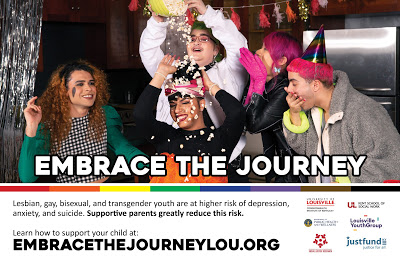Louisville campaign works to decrease high suicide rate among LGBTQ+ youth; focuses on importance of parental support

A new campaign in Louisville is working to decrease the high suicide rate among high school students who identify as lesbian, gay, bisexual, transgender and questioning by emphasizing the importance of parental support.
In the United States, high school students who identify as LGBTQ are almost five times more likely to attempt suicide than their cisgender, heterosexual peers, according to the National Alliance on Mental Illness. (Cisgender is the term for a person whose sense of personal identity and gender corresponds with their birth sex.)
“Though educating their parents can’t solve everything LGBTQ+ youth face, it’s a great place to start especially when the statistics speak so loudly for themselves,” Ryan Combs said in the news release. “When parents support their kids, youth have better mental health outcomes.”
The project, called “Embrace the Journey,” is led by Combs, an assistant professor in the School of Public Health and Information Sciences at the University of Louisville, and Maurice Gattis, associate professor in the university’s Kent School of Social Work. It was developed through the guidance of local health providers, public health professionals, LGBTQ+ youth and community members, says the release. (The + at the end of LGBTQ stands for “and others” and ensures an inclusiveness of all identities.)
Combs told Kentucky Health News that the campaign will start in Louisville and includes a 40-mile radius, with hopes of expanding it if successful.
The project stems from the findings of the U of L 2017 LGBTQ+ Adolescent Health Study, which found that 100 percent of the participants had heard homophobic or transphobic language, 61 percent felt unsafe and 27 percent had experienced physical violence at school, according to the release.
“We wanted to understand the health needs of LGBTQ adolescents in Louisville. We learned that the largest concern locally is mental health, especially depression, anxiety and suicidality,” said Combs. “We designed a campaign to target parents because they play such a key role in the mental health of LGBTQ youth.”
The reason LGBTQ+ adolescents report higher levels of poor mental health than heterosexual and cisgender youth isn’t because of their identity, “but rather that LGBTQ+ youth are often bullied and mistreated for their sexual orientation and / or gender identity / expression, feel misunderstood by other peers and adults in their lives, lack access to affirming health and social services, and are made to feel that who they are is wrong, shameful or politicized,” according to the campaign’s website.
It continues, “Studies show that when LGBTQ+ adolescents have support from even one adult – especially support from a parent or guardian – they are much more likely to maintain mental healthiness.”
The campaign launched at a recent Louisville Pride Foundation event, where organizers spoke to participants and handed out posters that read: “LGBTQ+ youth are more likely to experience depression, anxiety, and suicide – supportive parents greatly reduce this risk.”
Parents of LGBTQ youth can find more information about this campaign and additional resources at
embracethejourneylou.org, including advice from other parents, personal narratives from youth and a glossary of LGBTQ vocabulary.
The campaign was developed with grants from the Cooperative Consortium for Transdisciplinary Social Justice Research at U of L and JustFundKY, an anti-discrimination foundation, and works closely with Louisville Youth Group.